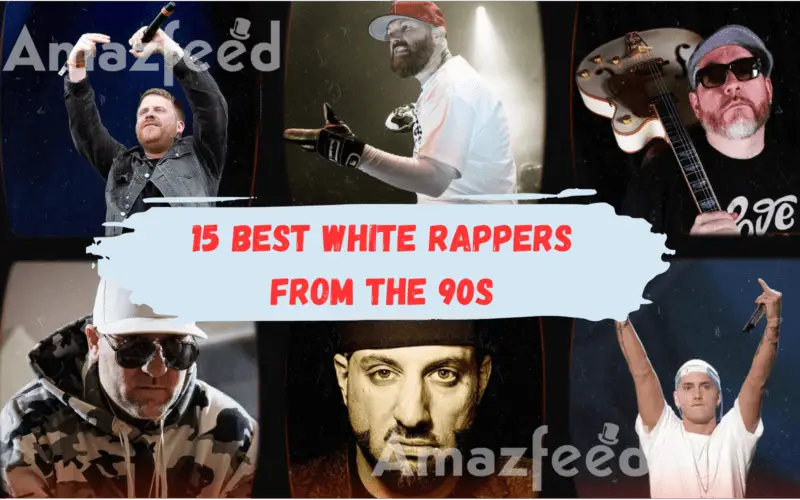Page Index
Rap music exploded into the mainstream in the 1990s, defining that decade. This created a new generation of artists who aimed to challenge the status quo and break down genre barriers. While black artists had traditionally dominated hip-hop, a number of Caucasian rappers who made significant contributions to the genre emerged in the 1990s.
Having grown up in predominately white communities, these musicians frequently drew inspiration from their personal experiences for their music. This article examines the 15 greatest white rappers of the 1990s, highlighting their distinctive styles, lyrical prowess, and contributions to the evolution of hip-hop.
These artists left an indelible impression on the decade’s music, from Eminem’s politically charged rhymes to the tongue-twisting lyricism of Aesop Rock and the socially conscious commentary of Everlast. Whether you’re a fan of 90 or not, we’ll also examine the challenges and prejudices encountered by white rappers in a predominantly black art form, as well as their efforts to break down barriers and earn the respect of their peers.
15. R.A. the Rugged Man
In the 1990s, the emergence of white rap performers in the music industry challenged the dominant hip-hop narrative. R.A. the Rugged Man is widely regarded as the most outstanding white rapper of the decade among these performers.
Despite criticism and skepticism from certain hip-hop purists, R.A. has garnered the respect and admiration of many for his distinctive style and lyrical abilities. Thorburn signed a contract with Jive Records, a prominent music industry player, at age 18. R.A. the Rugged Man has produced notable works such as “Definition of a Rap Flow,” “Gotta Be Dope,” “Sleeping Limb,” “Golden Oldies,” and “Bang Boogie.”
Also Read: 15 Best White Rappers From The 90s
14. El-P
Jaime Meline, better known as El-P, is a highly acclaimed rapper, producer, and executive in the music industry. He rose to fame in the 1990s as a member of Company Flow, a group that pushed the boundaries of hip-hop music and gained a reputation for innovation.
Despite facing challenges and criticisms as a white artist in a predominantly black genre, El-P persevered and established himself as one of the most influential and respected artists of his generation. His involvement with New York City’s hip-hop culture began early, and he formed a close friendship with DJ Mr. Len. Some of his notable tracks include “Deep Space 9mm,” “Stepfather Factory,” “EMG,” and “Flyentology.
Also Read: Top 15 underground white Rappers 2000s
13. Fred Durst
The 1990s were a period of rapid expansion for the music industry as new genres arose and established artists continued to refine their sound. This period witnessed the emergence of Caucasian rappers, who contributed a fresh perspective to hip-hop and helped to redefine the genre.
Fred Durst, the charismatic vocalist for the band Limp Bizkit, was one of the most prominent figures of this era. In addition to being a talented musician and lyricist, Durst was one of the few Caucasian rappers to achieve mainstream success in the 1990s.
Also Red: 15 Rappers with The Most Grammys won by a Female
12. Snow
Various cultures and subcultures influenced a distinct surge of rap music in the 1990s. Snow White rappers were one such subculture, consisting of white performers with a distinct rapping style that was frequently contrasted with that of their black counterparts.
Snow White rap was not a new phenomenon in the 1990s, but many Snow White rappers emerged during the decade. Prince effectively pitched Snow’s music to rap superstar M.C. Shan during a trip to New York. Snow traveled to New York in 1991, where Shan introduced him to music producers David Eng and Steve Salem.
Also Read: Top 10 Most Successful White Rappers In The World
11. Eminem
Marshall Bruce Mathers III, also known by his stage name Eminem, is a critically acclaimed American rapper, songwriter, and record producer. Due to his exceptional lyrical ability and distinctive style, he is widely regarded as one of the finest rappers of all time, which has earned him a devoted fan base and critical acclaim. Nonetheless, Eminem’s triumph was not devoid of controversy.
In the 1990s, as a Caucasian artist in the predominantly black hip-hop genre, he was subject to intense scrutiny and criticism. In 1988, he adopted the stage moniker MC Double M and formed his first band, New Jacks. Eminem’s notable songs include “Without Me,” “Drug Ballad,” “Mockingbird,” and “Rap God.”
Also Read: Top 50 Greatest Famous White Rappers list Of All Time With Their Biggest Hits [2023 Rank Updated]
10. Everlast
In the 1990s, Everlast, an American rapper, vocalist, and songwriter, rose to prominence as the leader of the rap ensemble House of Pain. Their chart-topping single “Jump Around” made them one of the most recognizable bands of their era.
Since then, Everlast’s music has consistently captivated audiences with its distinct combination of hip-hop, rock, and blues. He has carved out a niche in the industry, garnering worldwide critical acclaim and legions of fans. Notable Everlast compositions consist of “What It’s Like,” “White Trash Beautiful,” “I Get By,” “Black Jesus,” and “Lonely Road.”
Also Read: The Top 30 Best U.K. Rappers of All Time
9. Vanilla Ice
Vanilla Ice emerged as a prominent figure in the rap industry in the early 1990s, captivating audiences with his distinct style and undeniable charisma. As a white rapper, which was uncommon then, his success paved the way for other white performers aspiring to enter the genre.
There is no denying his influence on the hip-hop industry, even though opinions on his contributions to the genre are divided. Ice released his debut studio album, Hooked, on the Ichiban Records label in 1989. Then, he inked a contract with SBK Records, a subsidiary of the renowned EMI Group, which released a revised version of the album, To the Extreme, in 1990. Ice Ice Baby, Ninja Rap, Ride the Horse, Baby Got Back, and Vanilla Sprite are a few of Vanilla Ice’s most notable songs.
Also Read: Top 10 New White Rappers list in 2023
8. Kid Rock
With the emergence of rap, the 1990s signified a significant era in the music industry. This cultural phenomenon significantly impacted popular culture, and Robert James Ritchie, alias Kid Rock, rose to prominence during this time. Kid Rock created a distinctive sound by fusing rap, rock, and country music, and he penetrated the mainstream despite being one of the few white rappers of the 1990s.
In 1990, at 17, he contracted with Jive Records and released his debut studio album, Grits Sandwiches for Breakfast, with the assistance of D-Nice. All Summer Long, Picture, Bawitdaba, and Only God Knows Why are Kid Rock’s most deservingly-recognized compositions.
Also Read: 15 Rappers with the Most Grammy Award Wins
7. Brother Ali
From its humble beginnings in the 1970s to its current status as a multi-billion dollar industry, the rap industry in the United States has encountered numerous changes in the past few decades. However, the emergence of white rappers in the 1990s was one of the most significant shifts during that decade.
His discography is impressive, with seven albums, four EPs, and numerous singles and collaborations. Brother Ali’s best compositions are Uncle Sam Goddamn, Take Me Home, Room With a View, Truth Is, and Star Quality, to name a few.
Also Read: The Top 15 Best Philly Rappers of All Time
6.Vinnie Paz
Since its inception in the 1970s, hip-hop music has been an important part of American culture. Various artists have left their impact on the genre over the years, paving the way for new acts to emerge. These influential artists include Caucasian 1990s rappers. Vinnie Paz, who garnered prominence as a member of Jedi Mind Tricks, is one such luminary.
In 2016, he released “The Cornerstone of the Corner Store,” his third solo album. In September 2018, he released “The Pain Collector,” his fourth solo album. Notable among Vinnie Paz’s most remarkable works are “Cheesesteaks,” “The Oracle,” and “Monster’s Ball.”
5. Slug
In the 1990s, white rappers emerged in the music industry, but they encountered difficulty breaking into a predominately black field. Critics frequently referred to them as “slug” or “wack,” and their music was criticized for lacking authenticity and originality. Despite these obstacles, some artists attained moderate success and even garnered devoted fan bases.
In 1995, Slug, Anthony Davis, Musab Saad, and Brent Sayers founded the independent Minneapolis-based hip-hop record label Rhymesayers Entertainment. Slug’s notable tracks include “GodLovesUgly,” “Puppets,” “Trying to Find a Balance,” “Body Pillow,” and “The Loser Wins.”
4. Brian Green
In the 1990s, global culture underwent significant changes, including the emergence of hip hop as a new musical genre. This genre’s distinctive rhythms and socially conscious lyrics challenged norms and presumptions about who could partake in this art form by addressing the experiences of marginalized communities.
During this time period, the emergence of Caucasian rappers added a new layer of complexity to the evolution of the genre. Greene pursued piano studies with renowned concert pianist Jack Gibbons during his tenure at Oxford. His first book, The Elegant Universe: Superstrings, Hidden Dimensions, and the Quest for the Ultimate Theory, was published in 1999.
3. Marky Mark
The 1990s were an important time in the history of music, particularly in the hip hop and rap genres. This decade witnessed the emergence of a new wave of rappers who revolutionized the genre with their distinctive sound and manner. The Marky Mark performers, led by the talented and charismatic Mark Wahlberg, rose to prominence quickly during this period.
The group’s second studio album, You Gotta Believe, failed to match the success of their debut album, with only the title track achieving moderate success. Mark’s repertoire includes notable compositions such as You Gotta Believe, Wildside, I Need Money, and Gonna Have a Good Time.
2. Weird Al Yankovic
Famous musical comedian Weird Al Yankovic’s eccentric parodies of popular songs, have left an indelible impression on the music industry. During the 1990s, he also experimented with rap music, and his tracks are still widely admired.
In addition to starring in Al TV specials on MTV, Weird Al has made numerous guest appearances and provided voice acting for various television programs and online video content, demonstrating his exceptional artistic versatility. Notable examples include Another One Rides the Bus, Ricky, Eat It, I Lost on Jeopardy, and Smells Like Nirvana.
1. Aesop Rock
In the rap music industry of the 1990s, a number of accomplished and distinctive artists made significant contributions. Aesop Rock and “Weird Al” Yankovic are two of the most prominent individuals. Aesop Rock is renowned for his complex lyricism and poetic delivery, contrasting sharply with Yankovic’s humorous parodies and sardonic commentary.
1994 Northport High School graduate Bavitz was instrumental in the emergence of a new generation of underground and alternative hip-hop artists in the late 1990s and early 2000s. The tracks “None Shall Pass” and “1,000” are among Aesop Rock’s most notable and deserving of recognition.












